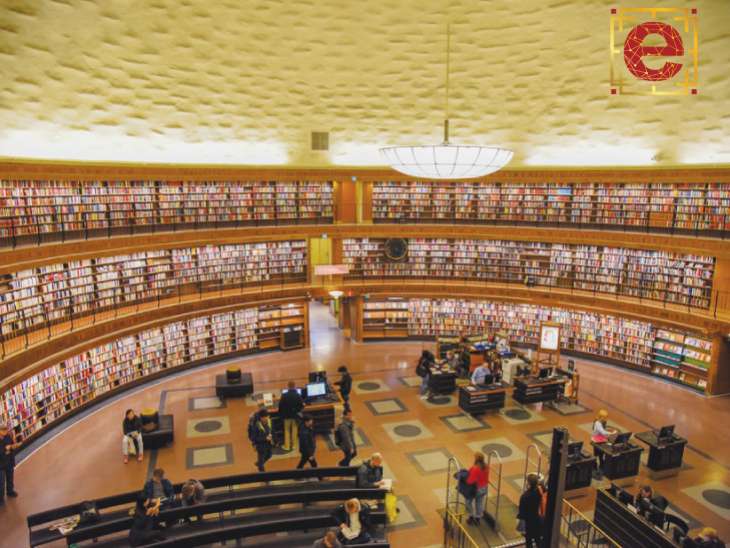Human Library – ‘The Living Book’
Exclusive Insights

Ever imagined how sheltered and fanatical you felt when you used to hear the stories from your grandfather or grandmother?? Do you miss it now? If yes, don't worry; Your wish can now be fulfilled. Using the same old-age idea of knowledge sharing, the concept of the ‘Human Library’, also known as the Living Library, was born.
Imagine if you could check out a person in a library just like a book; how would it work?
Was it jaw-dropping? Hang on! We have much more to surprise you! You can also have the same field as the Career option. Cling with us to know how you can make a bright career from it and how good you can earn out of it.
What is a Human Library?
Instead of borrowing books, visitors to the "Human Library" can "loan" a human being. There has been stigma, prejudice, or social exclusion against the "Books". In order to face their own prejudices and get a better knowledge of the other person, "readers" are free to ask whatever questions they may have.
The Human Library is a secure environment where we can investigate variety, confront our unconscious prejudices, discover our differences, and engage with people we would never otherwise encounter.
Objectives of Human Library
The notion is simple and easy to understand: one-on-one talks can offer a private experience of sharing, questioning, and reflection that has the power to change perspectives dramatically. The goal is to dispel prejudice and misconceptions through conversation.
The most notable aspects of the project are its optimistic perspective and straightforward design. Past participants at these gatherings have noted that they can be highly moving experiences for everyone involved. The majority of interactions happen in quiet spaces like meeting rooms, public libraries, or—as is the situation right now—the garden on the grounds of the Human Library. It should be noted that nobody is prohibited from raising challenging queries.
Where Does the idea of 'Living Library' come from?
At the Copenhagen Roskilde Festival in 2000', brothers' Ronni' and 'Dany' 'Abergel', along with partners ‘Asma’, ‘Mouna' and 'Christoffer Erichsen', founded the Human Library. They had this idea after their friend was killed, and they were members of a local NGO called 'Stop the Violence'. It started as a protest against violence but has now grown into a global forum for the fight against prejudice and social injustice. Over a four-day period, over 1000 people attended the event, which featured over 50 book titles.
How Does It Work?
The Human Library functions very similarly to a traditional library where people can check out books. The sole distinction is that all of the authors of the books are real people who have chosen to answer any inquiries and share their experiences candidly with an interested audience.
Every volunteer is a book about a specific subject. Interested readers can check out a human book for a predetermined time at a specified location (the organisers will specify the time and place) and engage in open dialogue about the subject. The standard borrowing time is 30 minutes. The chosen location should be cosy and offer enough seclusion to encourage candid and open communication. Questions from readers can be posed to human books, and they will do their best to respond. After finishing a book, the reader can return it and check out another available one.
Human Library in India
The multinational project' Human Library', established in 80 nations worldwide, first stepped in Indore and is still operational today. Nine more human library chapters can be found throughout India, including ones in Chennai, Hyderabad, Delhi, Mumbai and Junagadh. Everyone can explore authentic, uncensored stories that come to life with "Human Library," which is based on a series of incidents ranging from sexual assault to mental health in India.
This idea is not so popular in India, but it has a big market in foreign countries, and soon, it will have an ideal place in India, too.
Human Library as a Career option
Human Library is the best career option if you are open to sharing your experiences, meeting new people and challenging yourself. In India, you have little scope in this field compared to other countries, as this idea has yet to be fully developed. You can find many vacancies in the Human Library for multiple roles.
Conclusion
The session is enjoyable for both human books and human book readers. It is noted that HB engages with the readers politely, shares their experience, and transfers knowledge that was not previously explicitly recorded. More and more experts and resource people are willing to participate and become human books, and readers have begun suggesting experts and resource people for the panel.
Readers enjoy the session because it is conducted in a very casual manner, and they generally do not view the expert holding the position as anything other than a human book.
FAQ
1. What is a Human Library?
A book is a person who volunteered to represent a stigmatised group in the community and, based on their personal experiences, can answer questions from readers to help challenge what is being said/told/understood about a given topic.
2. Is there any Human Library in India?
There are nine other human library chapters across India – including in Delhi, Mumbai, Hyderabad, Junagadh and Chennai.
3. What are the objectives of the Human Library?
The notion is simple and easy to understand: one-on-one talks can offer a private experience of sharing, questioning, and reflection that has the power to dramatically change perspectives. The intention is to use discourse to refute discrimination and stereotypes.
4. How does the Human Library work?
Real humans are available for readers to borrow at the Human Library. A location where challenging inquiries are welcomed, expected, and addressed. Developed in Denmark in 2000, the Human Library is currently accessible in over 80 nations.
- HumanLibrary
- Humanbook
- humanlibraryinindia
- livinglibrary
- human library india
- objectives of human library

